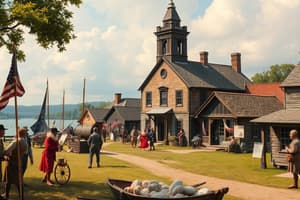Podcast
Questions and Answers
What does the common-sense notion equate history with?
What does the common-sense notion equate history with?
- Understanding changes over time
- Political events
- Memorizing dates (correct)
- Cultural practices
Historical questions are often easy to ask in everyday life.
Historical questions are often easy to ask in everyday life.
False (B)
What was the primary purpose of James Rennel's mapping of Hindustan?
What was the primary purpose of James Rennel's mapping of Hindustan?
To aid in the British conquest of India.
Historically, many people question the _____ of social practices, such as drinking tea.
Historically, many people question the _____ of social practices, such as drinking tea.
Match the elements with their significance:
Match the elements with their significance:
Why is it often incorrect to fix precise dates to historical processes?
Why is it often incorrect to fix precise dates to historical processes?
Historians only focus on battles and events when studying history.
Historians only focus on battles and events when studying history.
What kind of issues do historians today explore in addition to battles and political events?
What kind of issues do historians today explore in addition to battles and political events?
The practice of associating history with a string of _______ has historical roots due to past writing styles.
The practice of associating history with a string of _______ has historical roots due to past writing styles.
Match the following terms with their descriptions:
Match the following terms with their descriptions:
Flashcards are hidden until you start studying
Study Notes
Importance of Dates in History
- Historians have historically placed significant emphasis on dates, often associating history with memorizing specific events.
- Common perception views history as tedious due to its focus on dates, leading to a belief that dates are the essence of historical study.
- History examines changes over time, making it necessary to reference periods rather than just specific dates.
Historical Questions and Curiosity
- Everyday observations can spark historical inquiries about past practices and changes.
- Examples include questioning the origins of drinking tea or coffee and the history of railway travel.
- Such inquiries illustrate the connection between contemporary life and historical developments.
The Role of Time in Historical Analysis
- Time in history is not always about exact dates; many processes evolve gradually rather than occurring on a single date.
- Historical events such as the establishment of British rule or the rise of the national movement cannot be pinned down to specific days—they unfold over extended periods.
- Understanding history requires recognizing approximate time frames for significant changes rather than pinpointing exact dates.
Transition in Historical Focus
- Traditional history centered on battles, rulers, and significant political events, often with specific dates assigned to these occurrences.
- Contemporary historians broaden their focus to include a variety of social, economic, and cultural factors, examining aspects like livelihood, production, urban development, and cultural shifts.
Criteria for Selecting Significant Dates
- Specific dates chosen for historical narratives serve specific storytelling purposes but are not inherently significant.
- The selection of dates often reflects the interests and perspectives of historians, impacting how history is perceived and taught.
Studying That Suits You
Use AI to generate personalized quizzes and flashcards to suit your learning preferences.




